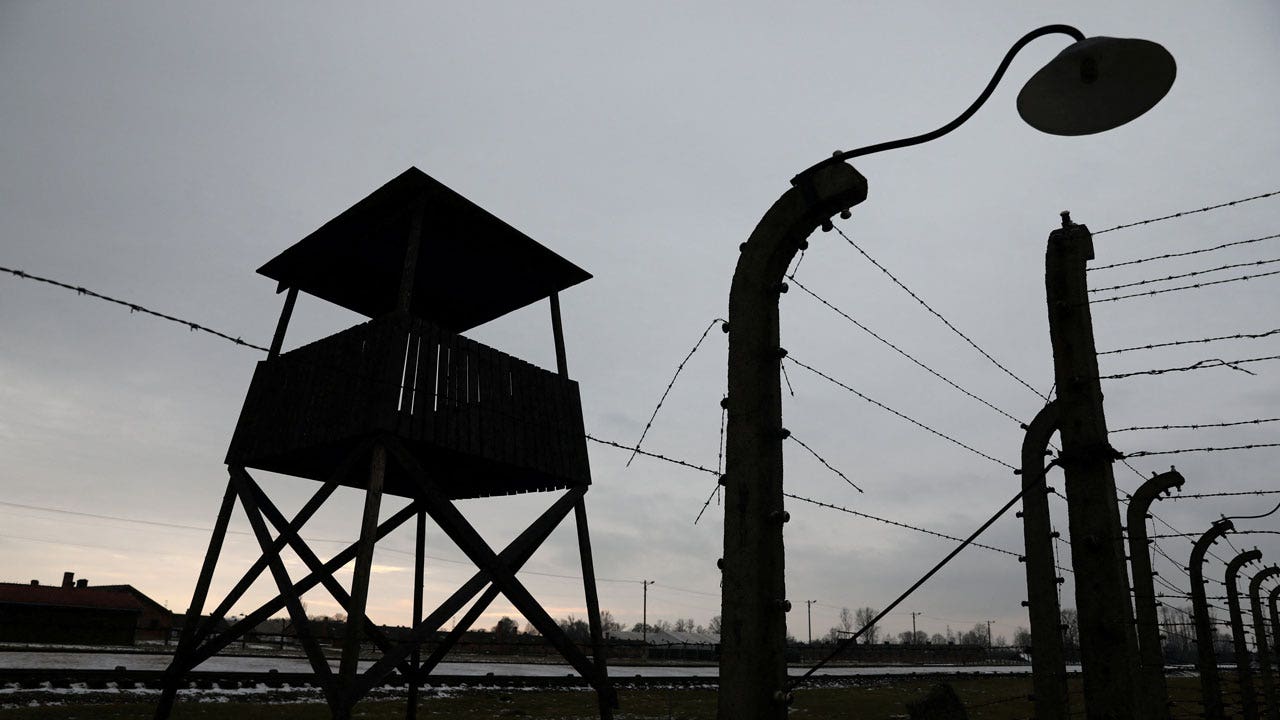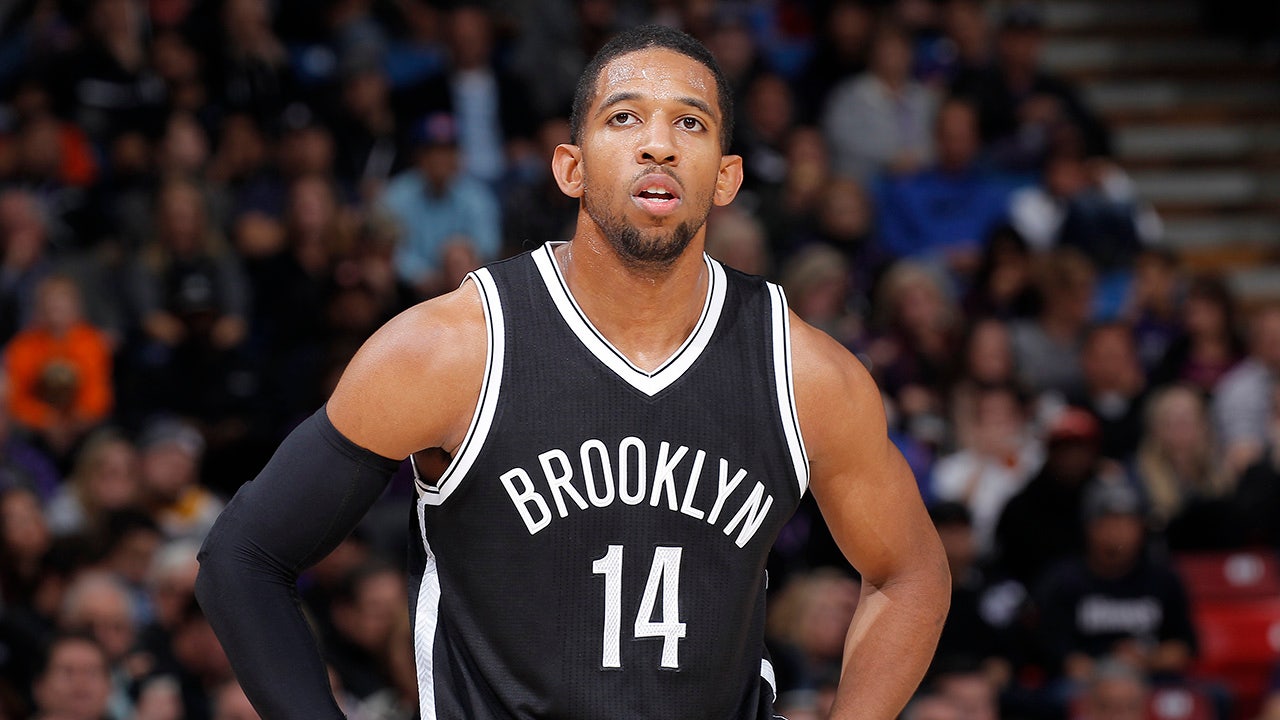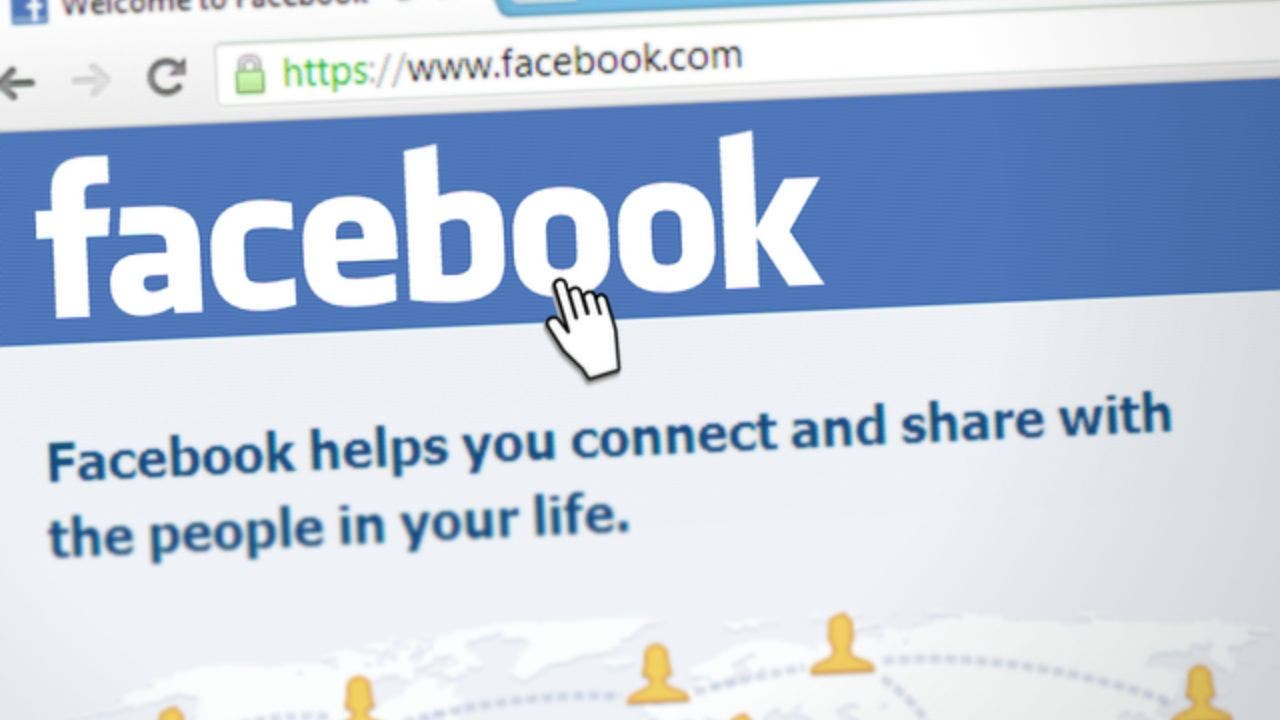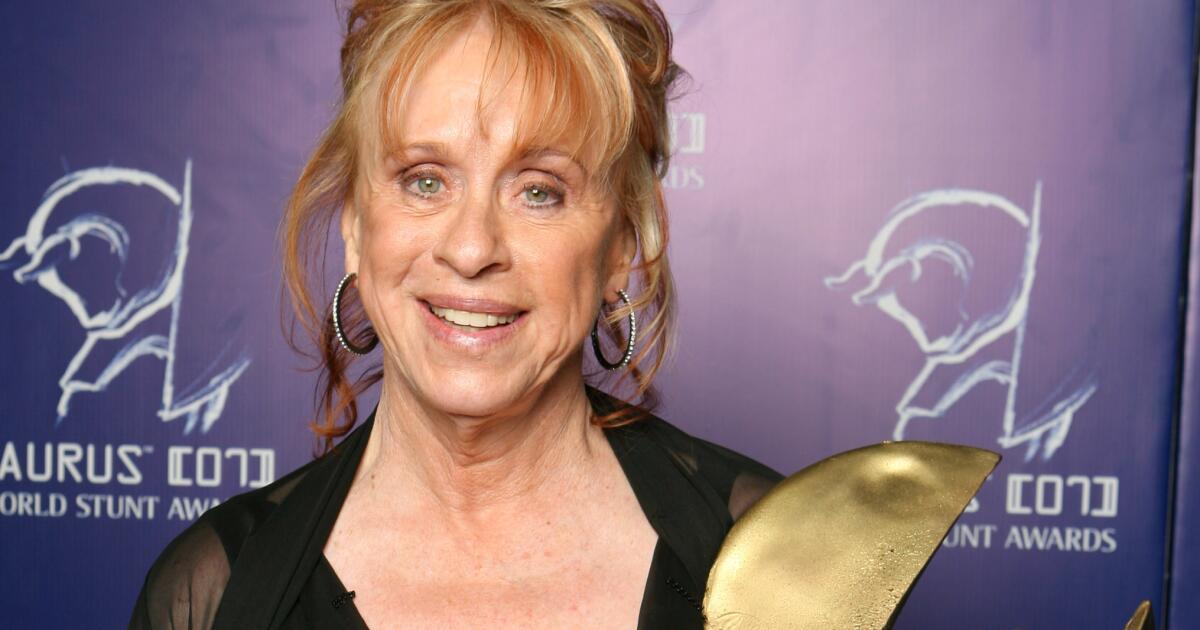Lifestyle
How L.A. Chess Club is giving nerd culture a Gen Z makeover

Picture this: It’s a Thursday night in Santa Monica, and you’re feeling good. You’re sitting across from a cute stranger, and the vibes are vibing. In a spacious warehouse-style space, which might sound a tad sketch but somehow isn’t at all, 20- and 30-somethings are seated around rows of tables with chess boards. House music is bumping, and drinks are flowing. There’s pizza being made on-site, and two tattoo artists are around if you’re feeling adventurous and looking to commemorate the experience. And if you need a buffer for maintaining conversation with someone unfamiliar, no worries.
All of this is unfolding as you play a low-stakes game of chess. This is the magic of L.A. Chess Club.
From 8 p.m. to midnight every Thursday, happy regulars and excited first-timers show up to play chess and exercise their social muscles. On this particular night in early April, 250 people show up, some opting for heels and outfits you’d see at a chic lounge, with many others going the casual route — yet neither group looks out of place. Whether you’re looking to competitively play chess, learn the game , meet new friends or mingle as a single person, all are welcome by founder Michelle Kong.
A circular chess board made by an event attendee is shown at a weekly L.A. Chess Club meetup.
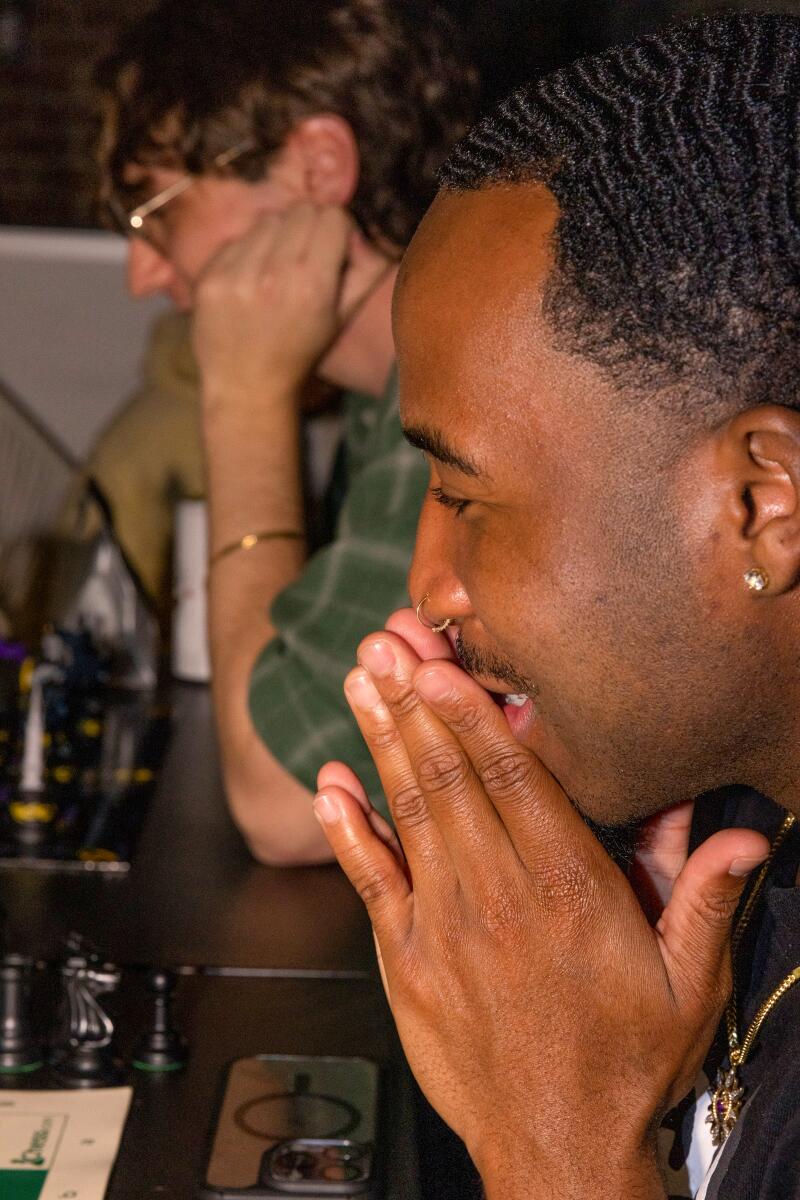
Chess player Jonathan Erving waits for his opponent to make a move.
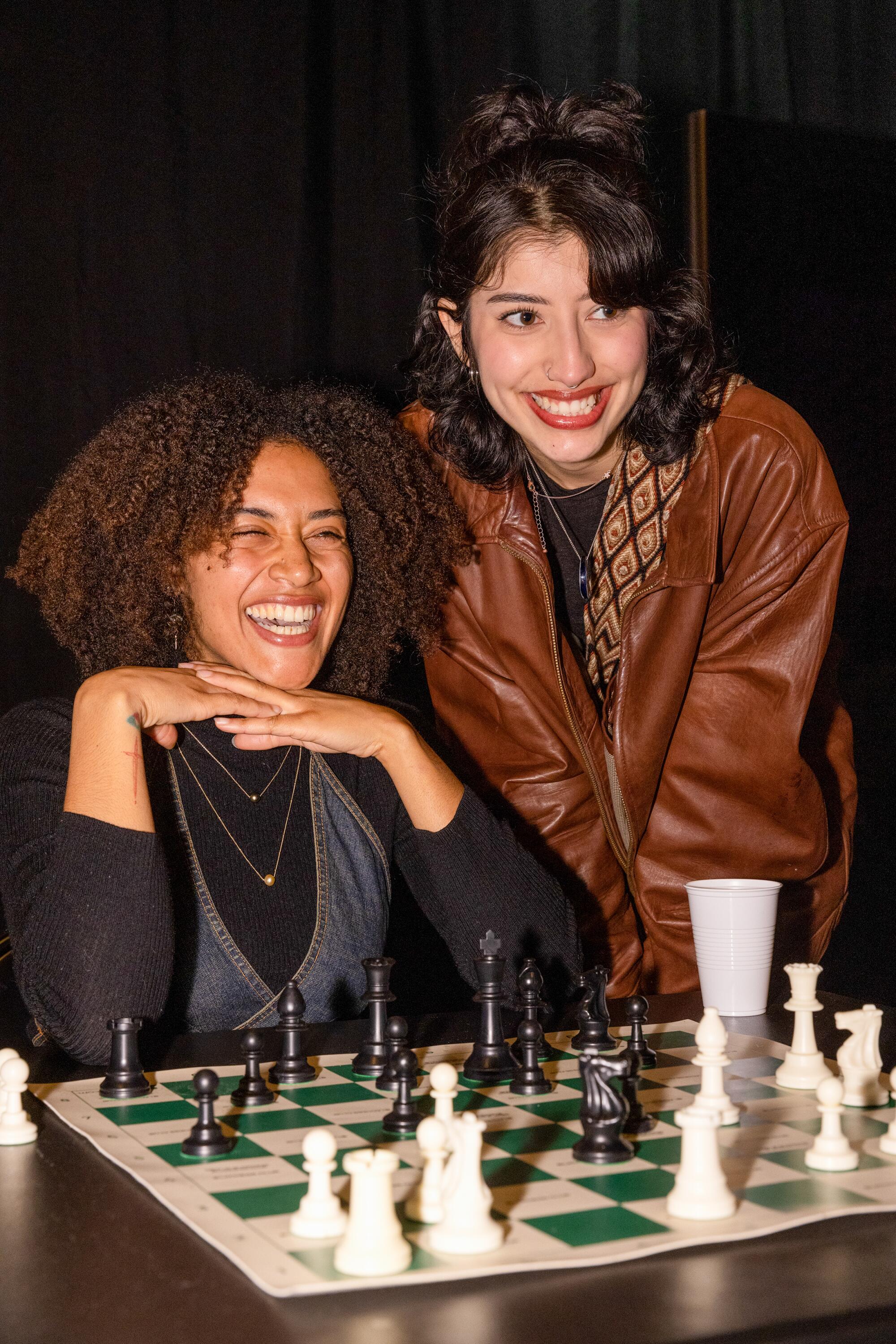
Imani Cheadle, left, and Mandy Sherma play a game of chess together with new friends.
Around the country, people are hungry for connection and eager to seek it out following the collective trauma of COVID-19 closures. In-person gatherings that lean into the preciousness of sharing space and being still with one another are on the rise, and Los Angeles is no exception. More supper clubs have emerged, while slow burns like magazine collaging are a hit. There’s more emphasis on romanticizing and reimagining everyday activities and an increased interest in speed dating. The need for more thoughtful spaces to connect with new friends or romantic prospects for a few hours of casual conversation is palpable, and L.A. residents are stepping up.
Liam Blackburn, 22, has been coming to L.A. Chess Club for the last nine months. The exciting rounds of speed chess plus the consistent young crowd initially piqued Blackburn’s interest. But the meaningful connections he’s made while attending are what quickly turned him into a regular.
“I feel like I can actually talk to people and even meet them at a deeper level instead of ‘Hey, how you doing? Wanna dance?’” Blackburn says, emphasizing the refreshing change of pace that low-key, mellow-yet-lively chess meetups offer versus the loud music and social pressure of being at L.A. bars and nightclubs.
On this night, Blackburn arrived at L.A. Chess Club with his girlfriend, Courtney Zajac, 23. After the two met and played a game of chess at a past Chess Club event, sparks flew, and they decided to spend time together again. Now the couple, both of whom were already seasoned chess players, count the Thursday event as a regular stop on their social calendar.
“Sometimes you just cross paths with someone who is an absolute breath of fresh air, and Liam is undoubtedly one of those people no matter the setting,” Zajac says of her experience connecting with Blackburn. “I didn’t attend Chess Club with the intention of finding a romantic connection but I left my first evening in attendance knowing I’d met someone whose company I couldn’t get enough of — and whose chess skills were truly humbling. It was absolutely special and memorable, and I can’t say I’ve experienced anything quite like it before.”
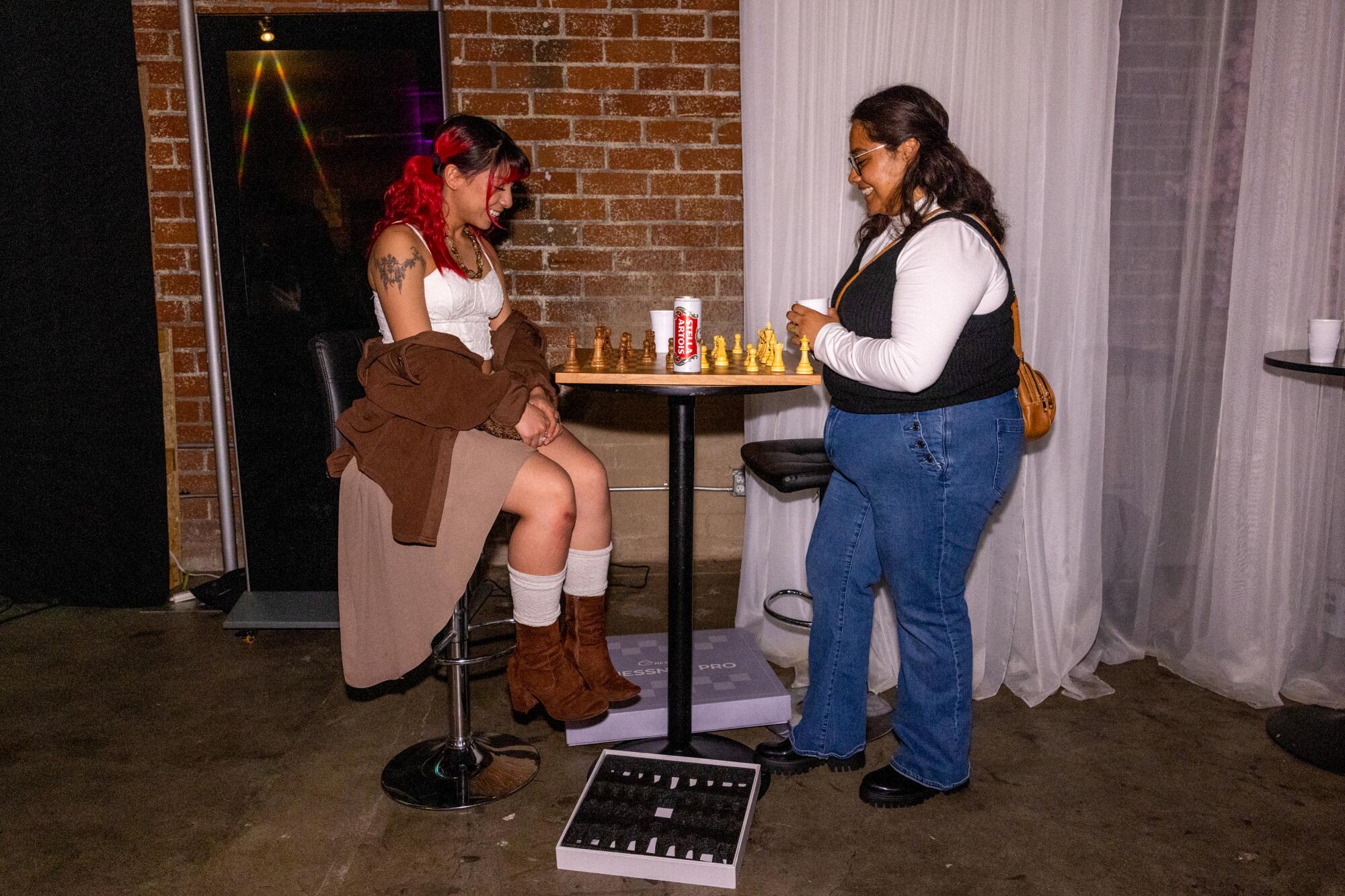
New friends Sofia Contreras, left, and Jen Castro play a game of chess together.
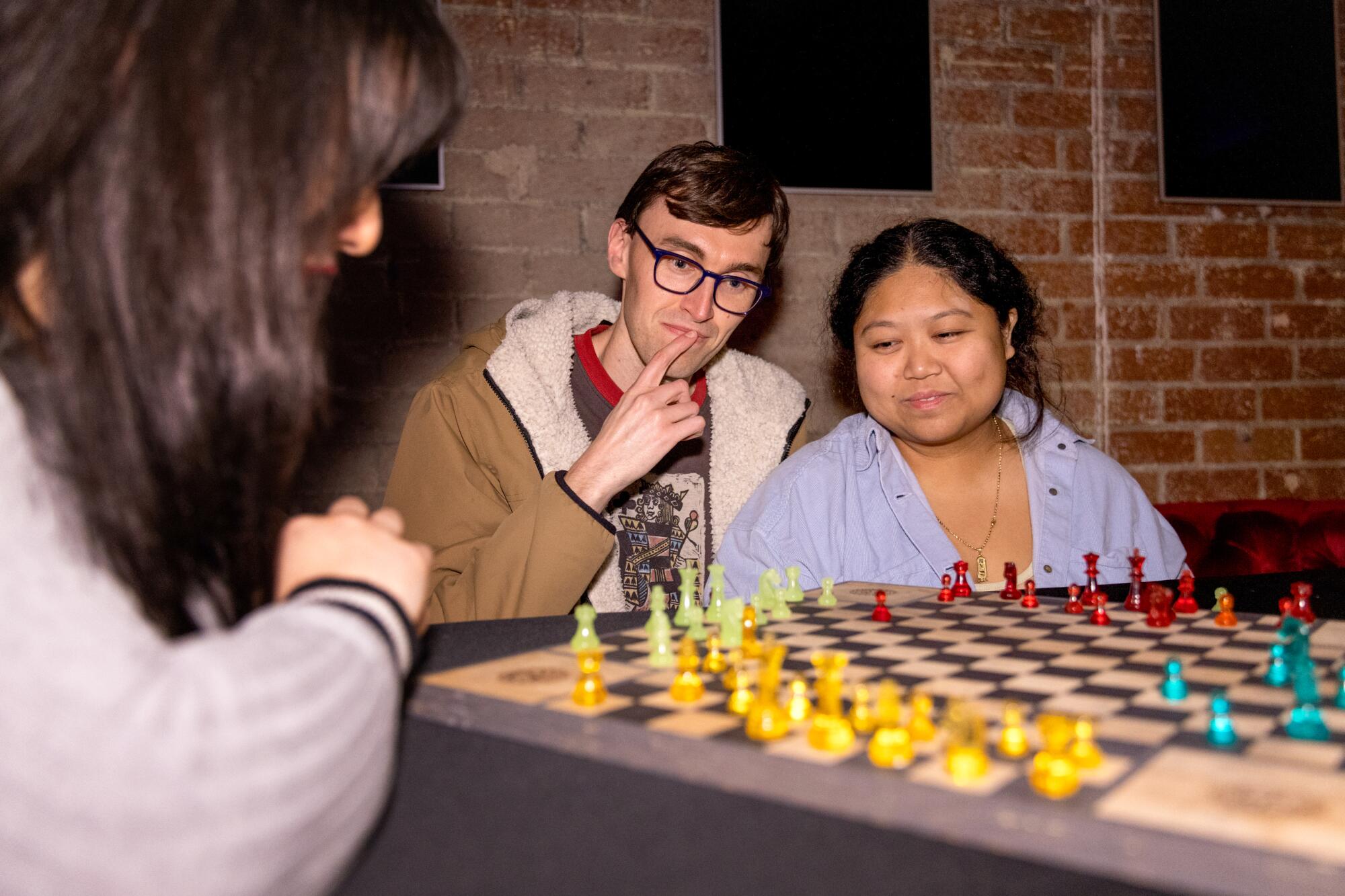
Suha Kalish, left, and couple Fred Muth and Hanz Legaspi play chess together on a multi-player board during an L.A. Chess Club night.
Founder Kong, 26, has struck gold with this formula: an event with the laid-back ease of a chill game night and all the social and romantic possibility of a night out on the town. However, what the popular weekly chess events have grown into was never Kong’s intention when she launched the club in June 2023. “I just wanted to play chess,” she says lightheartedly.
About two years ago, when Kong first started playing chess, she was “immediately hooked” and became an avid online player. “My friends didn’t play chess, and I was like, ‘I need to find people to play chess with in person,’” Kong says. “I did my own research and went to a chess club, and it was just all older men playing chess in silence in this basement.” After Kong did some additional research and checked in with friends, she noticed that chess clubs for children and adult clubs made up almost exclusively of men seemed to be the norm.
“I really needed a chess club for people my age and in my proficiency level as well, so I made one,” she says.
After the success of L.A. Chess Club’s singles event for Valentine’s Day in February, Kong better understood how many people came to the events in search of deeper, meaningful connections. The club has relocated to a permanent location in the downtown Arts District to accommodate its growing roster of regulars.
Actor and event producer DeShawn Cavanaugh says L.A. Chess Club is helping to meet the growing need for fresh social spaces beyond the typical nightlife scene.
Cavanaugh, who produces comedy events around L.A. such as Curson n’ Screamin’ and A Tribe Called Melanin through his company 3mpower Media, enjoyed himself during his first Chess Club experience.
“I think people are looking for activities and something stimulating that’s not just drinking or listening to music,” he says. “All of those things are great, but especially in L.A., we have so many artists, they need something to chew on. These types of social events have been a really great way for people to reconnect with others and themselves.”
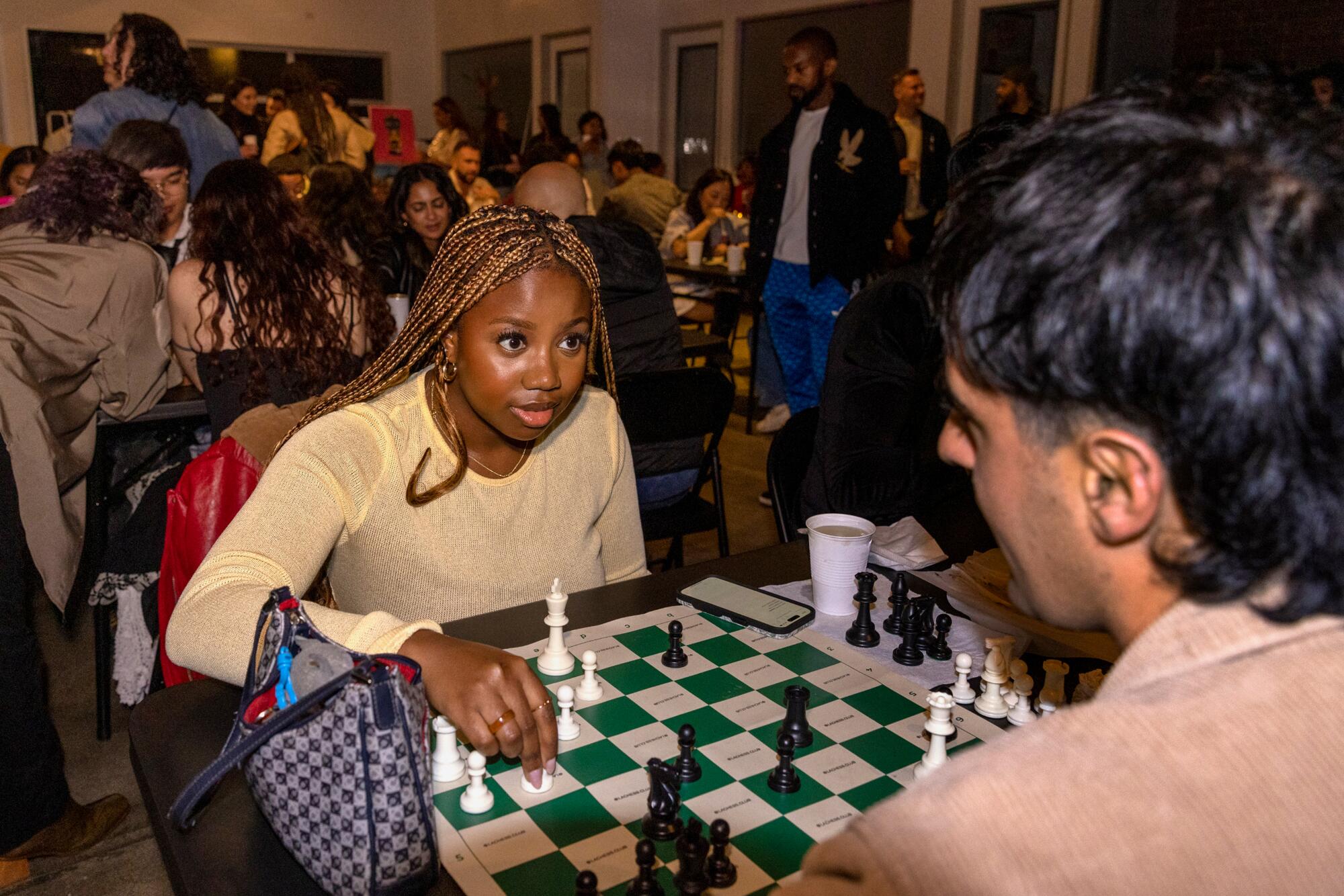
Janet Akisanmi, left, from Dallas, plays a game against Kabir Kang, of Los Angeles. Akisanmi and her friend Grace Feyisetan were visiting L.A. for a month from Dallas and saw the event on TikTok, so they decided to check it out.
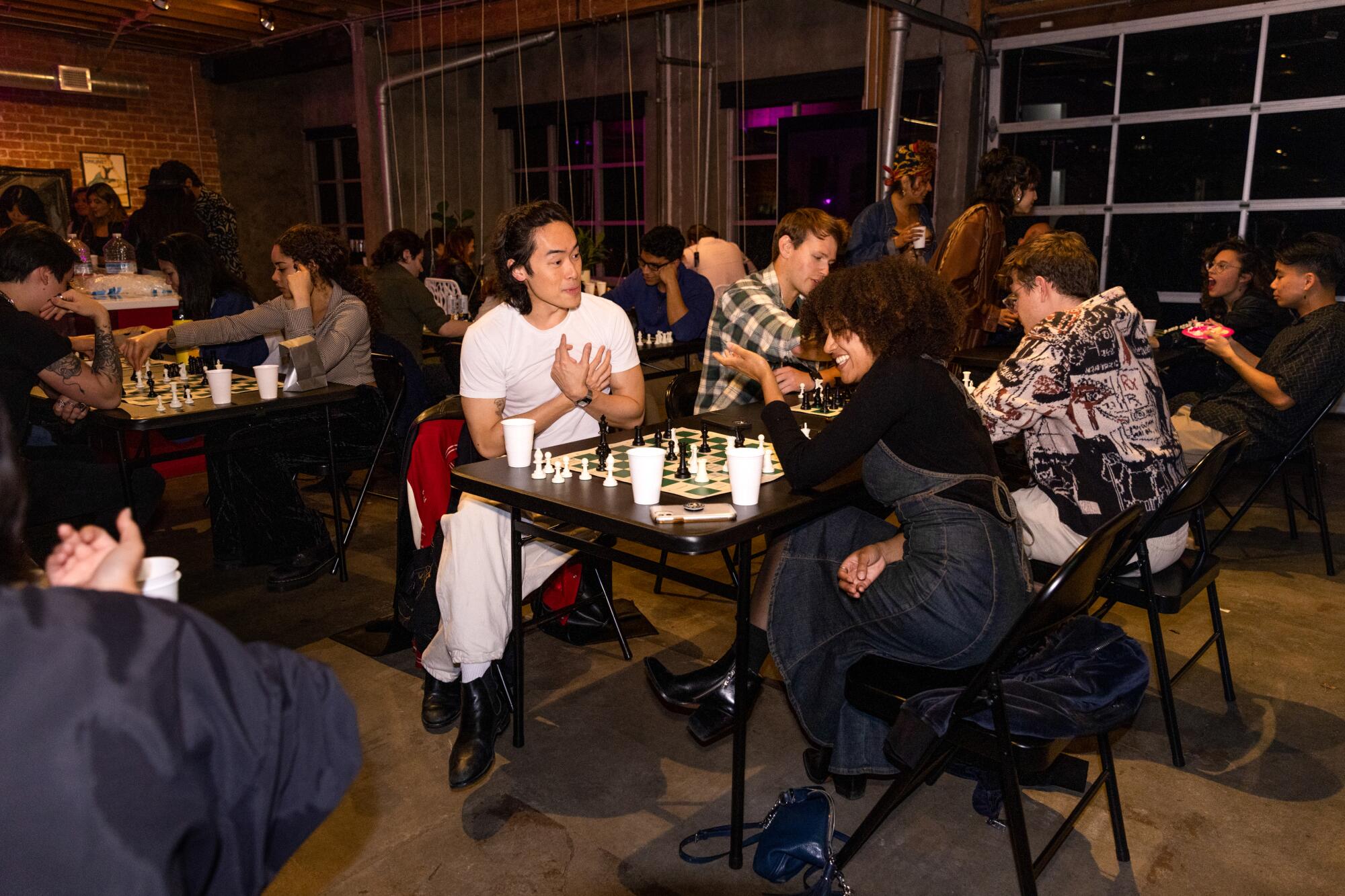
Tiger Ji, left, and Imani Cheadle play chess together during a recent L.A. Chess Club night. It was Ji and Cheadle’s first time at the event. “It’s really fun,” Ji says. “I got really into chess during COVID, but most of it was playing online. It’s rarely social. This is less so about playing chess and much more about getting to know people. I just moved to L.A., and this is great.”
Bijan Sanchez, 30, has been in quite a few chess communities in L.A., but none were a great fit. “I stopped playing chess for the longest time, and I just joined Catan clubs. I feel like the community is more friendly,” Sanchez says.
After friends recommended he visit L.A. Chess Club, Sanchez has finally found a chess environment that resonates. “I loved it a lot. I think it was one of my favorite nights out in L.A.,” he says. “I like that there was a good diversity of different people. I feel like everyone is kinda like cool nerds, and I think I identify as that, as someone that’s an outgoing nerdy guy. I vibe with the culture and people.”
Sofia Contreras felt compelled to visit L.A. Chess Club after seeing the event highlighted on TikTok by Taylor Morgan McPherson, a.k.a. the Sparkle Queen. McPherson featured the event in her “Where to Meet Men” series, which has grown increasingly popular among L.A. singles, and helped boost awareness of Chess Club. “She motivated me to come out. The [turnout] was a lot better than what I expected it to be,” Contreras says with a smile, standing next to Jen Castro, a friend she made earlier in the evening. “I’m here now and I’m having fun.”
“I’m always checking out what’s new in L.A. to meet people in person because I don’t have the best luck on dating apps,” says McPherson. “You know, being a Black woman, dating apps aren’t really skewed for us.” On McPherson’s first visit to Chess Club, she arrived solo and had a pleasant experience. “I was a little nervous. I was a little timid,” she says.
“Men approached me immediately. It was really nice,” McPherson says, recounting a positive experience at the bar and that more seasoned male players patiently walking her through the game. “Everyone was so open and willing to teach, which was so refreshing.” By the end of the night, McPherson had made a connection and exchanged numbers with someone. Now, McPherson is another attendee-turned-vendor who offers a range of glittery body, face and hair embellishments to Chess Club members each week through her Kourtney Kardashian-approved biodegradable Sparkle Bar.
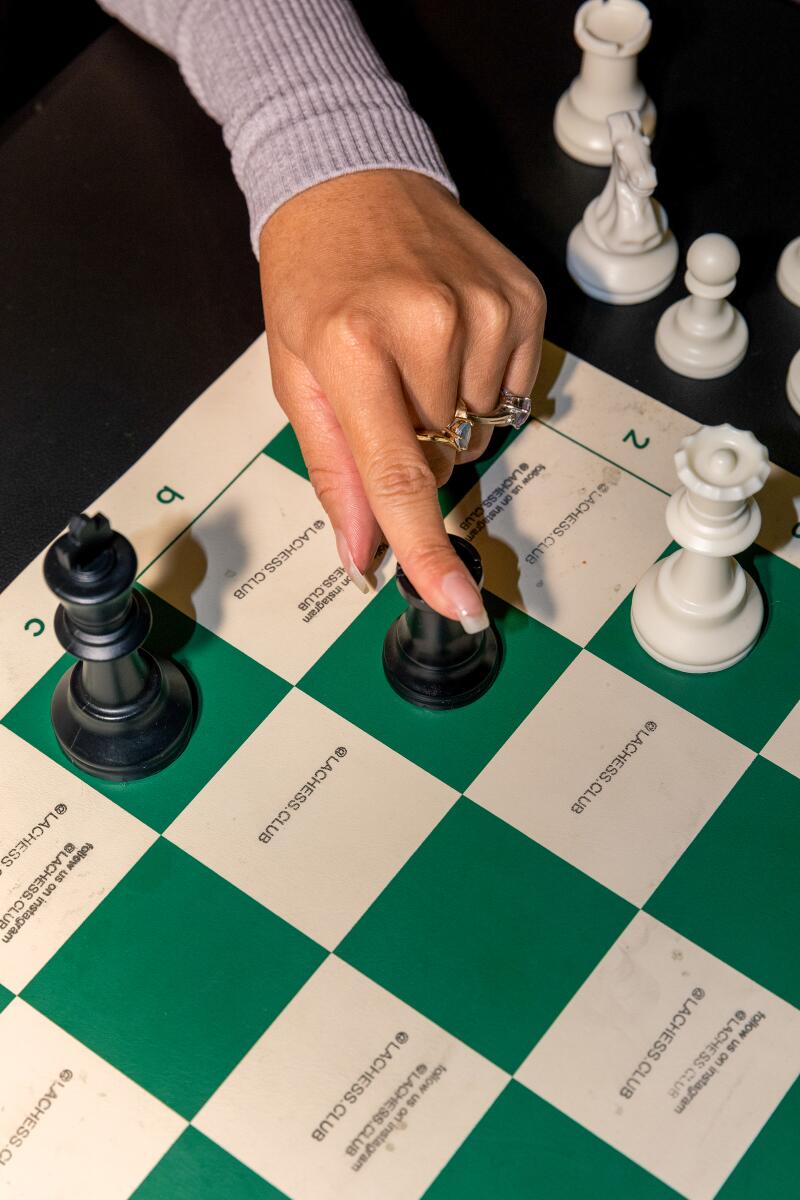
Kamarya Singh makes a move against her opponent at L.A. Chess Club.
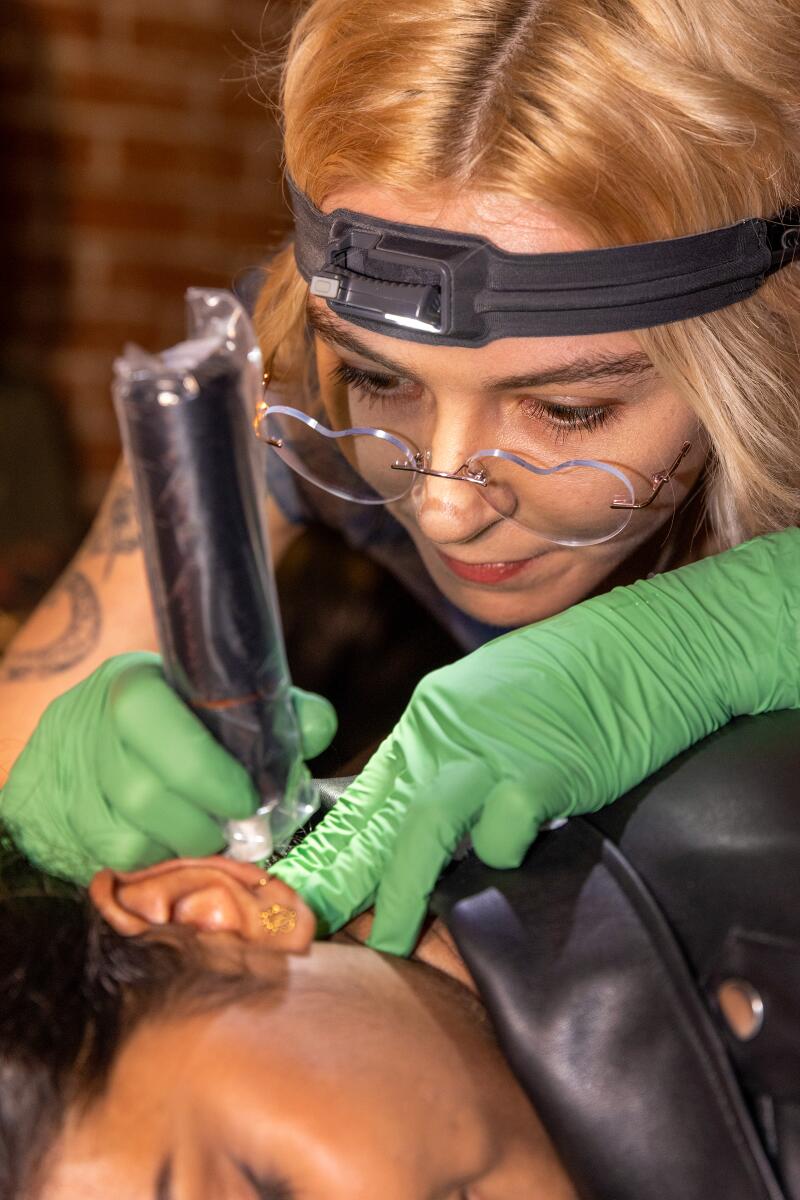
Tattoo artist Clover Fields gives Eliana Pandian a small heart tattoo behind her ear during L.A. Chess Club. Other highlights included a DJ, glitter tattoos, hair tinsel and tarot readings.
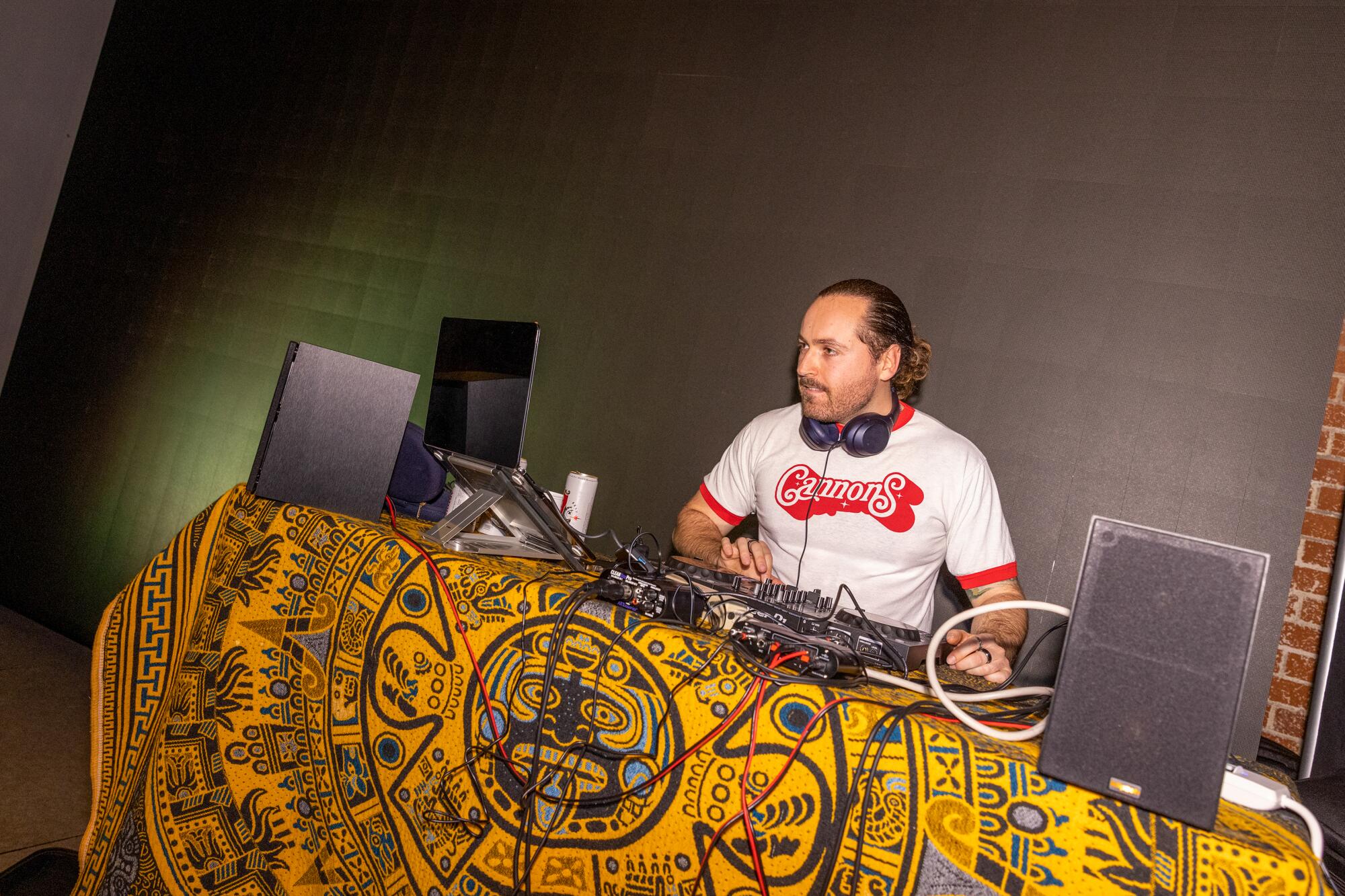
Dennis Neymit, a.k.a. DJ Dill, plays music during the second half of L.A. Chess Club on a recent April night.
Attending the event cost $60 for men, with free admission for women. Regulars can access a discounted rate through a recently launched loyalty program.
The price structure is a move that aims to boost the low number of women in chess while eliminating barriers to entry, says Kong, adding that many of the club’s long-term male members were supportive and willing to pay double in support of the mission.
“Women making up only 10% of chess players is crazy,” Kong says. “The statistics do not look great. Our ratio is almost 2 to 1 now, women to men, and it’s proven that it works. A lot of people are very supportive. It’s really great to see.”
Ultimately, the event is what you make of it, Kong says, noting that people who’ve attended L.A. Chess Club have made all sorts of connections: finding roommates, meeting romantic partners (straight and queer) and making new friends.
For Nyne Nelson, 33, an intuitive and attendee-turned-vendor at L.A. Chess Club, getting to know people within the chess community has been rewarding, especially after enduring the intense isolation of the COVID-19 shutdown. “I’m a very introverted person, so coming to a place where I can play a game and talk to people works out very well for me — and also reading people and giving guidance,” says Nelson, who offers tarot readings on a sliding scale at the weekly event. “Sometimes people just need guidance, and that’s what I’m here to do. I don’t tell the future. I just give a direction on where to go.”
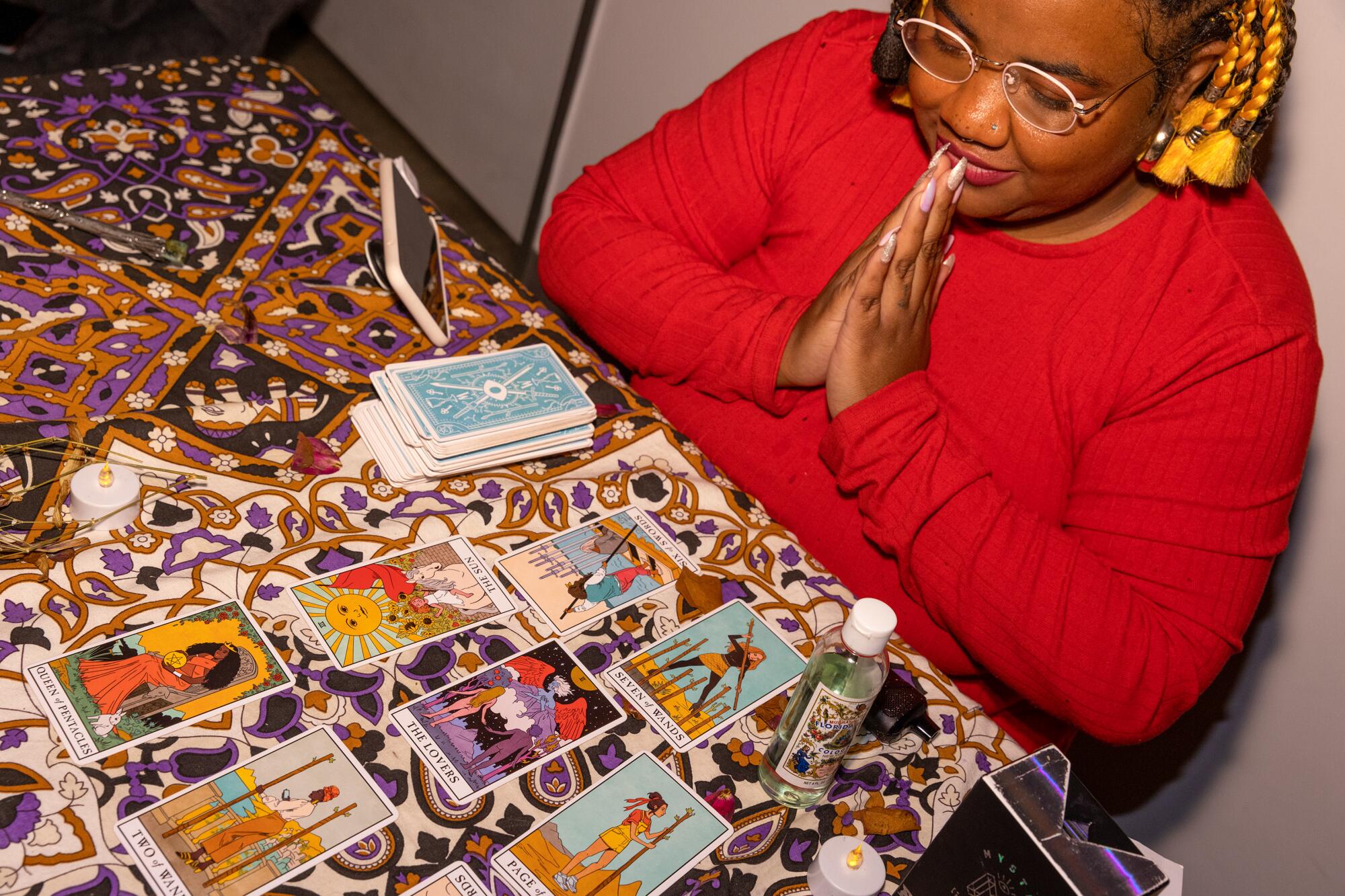
Nyne Nelson, a.k.a. Haus of 9 Tarot, gives a reading during L.A. Chess Club.
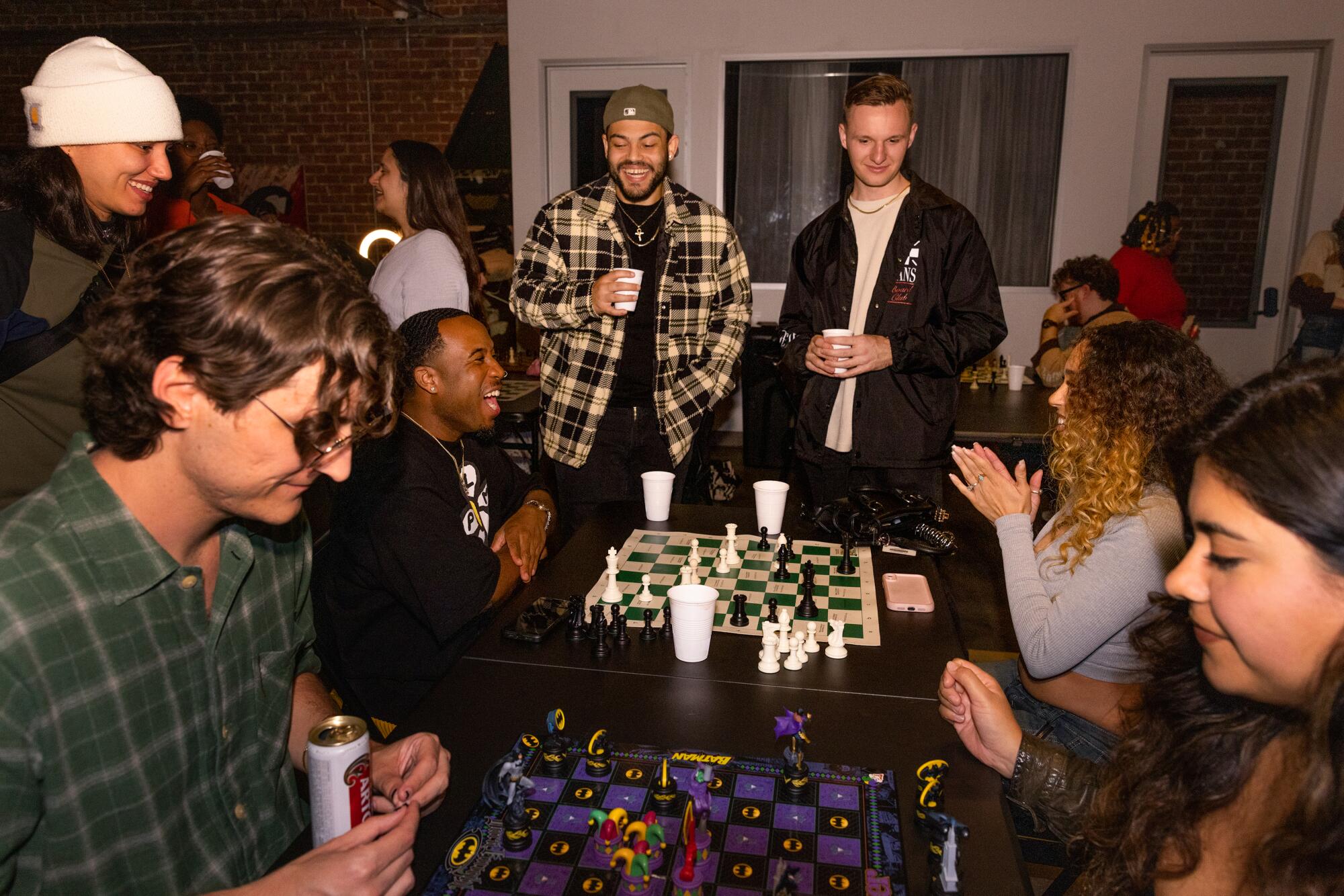
Jonathan Erving, center left, and Kamarya Singh play chess against each other as friends Jared Washington and Brandon Walker cheer them on.
Kong left her finance job and focused on L.A. Chess Club full time. “I think betting on yourself when you’re young yields good returns,” she says. “I invested everything I had to keep Chess Club running every week for nine months before I monetized [it]. It’s not easy. I’m just very determined.”
Despite the club still being in its infancy, the growth has been rapid, with weekly events averaging about 200 people.
“When you’re waking up at 5 a.m. and listening to Bloomberg in the morning and looking at stocks, it’s a very different start of the day than when you get to wake up and work on something you’re passionate about,” she says. “There’s so much opportunity here, especially compared to the environments that I was exposed to when I first went to chess clubs. I’m so happy that I’m able to bring this type of positive experience to people for the first time they interact with chess.”

Lifestyle
My 17-year-old Honda, Broomhilda, met a tragic end. Why do we grieve when our cars die?

Our 17-year-old Honda CR-V (affectionately dubbed “Broomhilda”) met her tragic, premature demise last summer when a deer bolted out of neighboring woods, straight into her hood. My husband, who miraculously emerged unscathed, managed to drive it home and repair the dent. Unfortunately, unknown to us, radiator fluid slowly leaked into her engine until, months later, we pulled into our driveway to find our kids frantic as plumes of smoke rose out of her hood, every single alert on her dash alight like a Christmas tree. She was toast — and she smelled like it. Watching a tow truck pull her out of our driveway one last time, I felt an unexpected residue of sadness that lingered for longer than I expected.
I’m hardly the only person to grieve a little when my car dies. I’m also not the only person who felt compelled to give my car a name. George Slavich, director of UCLA’s Laboratory for Stress Assessment and Research, says we sometimes can’t help but attribute personality characteristics to the objects we love. “People tend to anthropomorphize certain objects like cars, even giving them names, because our brains are hard-wired to see personality even when it’s not possible to exist,” he says.
So why do we grieve our cars? If you live in L.A., your car isn’t just a means to get from A to B and back again — it’s a small mobile home. You spend so much time in your car that it becomes a transient residence where significant memories are made and milestones are met and, like our homes, we can get emotionally attached to the places where these things occur. For nearly two decades, Broomhilda was that mobile home for our family. We brought our now-teenage child home from the hospital in her. We used her to drop our oldest kid off at college. She carried us in sickness and health, on countless family road trips and terrifying jaunts to the emergency room. We stuffed her with furniture, balloons, cake, pets and more children than legally allowed to and from birthday parties. Her gray cloth backseat was covered with dog hair and a few remaining telltale stains of the regurgitated chocolate milk of a carsick toddler. As she was towed out of our driveway beyond sight, her scraps destined to resurrect other vehicles, I was confident she was dragged off to her metallic grave with a few errant Airpods, a good amount of loose change, and possibly a few baby teeth still lodged beyond reach in her cushions.
Even with the mounting malfunctions of age, Broomhilda housed myriad mementos and sparked zillions of mundane memories — the kind we make daily but take for granted. “Memories are inextricably linked to the context in which they are made, and for many people growing up in the United States, that context likely involved a memorable car or two,” Slavich explains. Because teenage brains are hot-wired (see what I did there?) to form social memories, important social experiences like a first date, first kiss or first joyride might link back to the car you drove or rode in at that time in your life. “When these types of life events occur, your brain encodes not just the circumstances of the event itself, but also the smells, tastes and contextual features of the environment. So, the cars in which our lives unfold become an inherent part of our personal story and history,” he says.
In a busy commuter city like Los Angeles, your car is one of the few places where you have complete control over your environment. Says Slavich: “Amongst all the hustle and bustle of the city, you can roll up the windows, set the temperature exactly how you like it, and play relaxing meditation music or, if you prefer, put on your favorite Jay-Z or Britney song and sing as loud as you want.” Also, whether you’re cognizant of it or not, your car is a space where you entertain. “Every time my friends came into my car they had an experience, whether it was through music or the adventure,” says Monica O’Neal, a Boston-based clinical psychologist and relationship expert.
Our cars also house various aspects of our interior and exterior lives. For one, they’re symbolic of our sense of self and autonomy. “Your car represents you,” says O’Neal. “In some ways, they hold such a sense of our identity, and some narrative of our life and our struggle.” On a surface level, for better or worse, you might be judged by the kind of car you drive, which is something of an L.A. epidemic. Says O’Neal: “Cars are kind of almost like your clothing. When people see you getting in and out of a car, you’re going to have an immediate sense of their identity.” She also says our cars are one of the few private spaces in our lives. “If you’re commuting, you’re spending a bunch of your life in your car. That might be the place where you have privacy, and time alone with your thoughts.” Losing a car might also mean losing a sacred space you might rely on to process your feelings.
The most important thing to know if you’re grieving for your car is you aren’t missing some random object — your car was a sacred space that served as a vessel for the memories you made in it. Any feelings of grief are perfectly normal, are common and, in due time, will pass. It’s been months since Broomhilda went to the scrap heap and I’m still car shopping. Naturally, I’ve been most attracted to CR-Vs. They won’t be Broomhilda, but I know they’ll fit us perfectly.
Lifestyle
'Jerrod Carmichael Reality Show' exploits pain for good : Pop Culture Happy Hour

Lifestyle
FBI looks into thrill-seeking teachers alleged to have been international art thieves
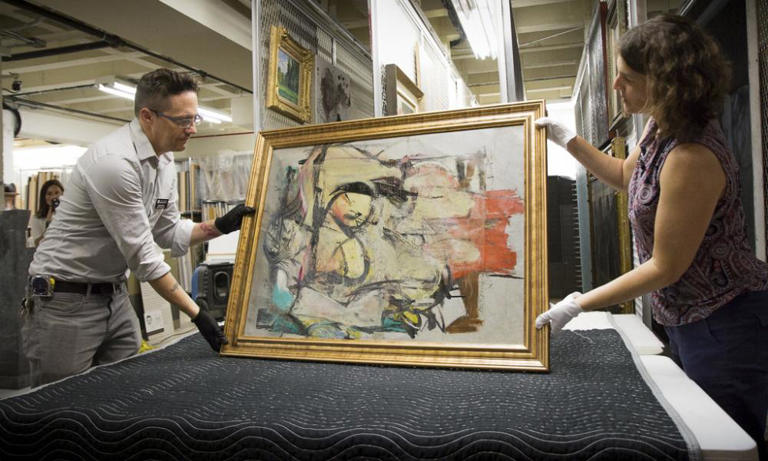
-

 Politics1 week ago
Politics1 week agoColumbia University’s policy-making senate votes for resolution calling to investigate school’s leadership
-

 News1 week ago
News1 week agoBoth sides prepare as Florida's six-week abortion ban is set to take effect Wednesday
-

 Politics1 week ago
Politics1 week agoGOP Rep. Bill Posey won't seek re-election, endorses former Florida Senate President as replacement
-

 World1 week ago
World1 week agoBrussels, my love? MEPs check out of Strasbourg after 5 eventful years
-

 Politics1 week ago
Politics1 week agoHouse Republicans brace for spring legislative sprint with one less GOP vote
-

 World1 week ago
World1 week agoAt least four dead in US after dozens of tornadoes rip through Oklahoma
-

 World1 week ago
World1 week agoRussian forces gained partial control of Donetsk's Ocheretyne town
-

 Politics1 week ago
Politics1 week agoAnti-Trump DA's no-show at debate leaves challenger facing off against empty podium
